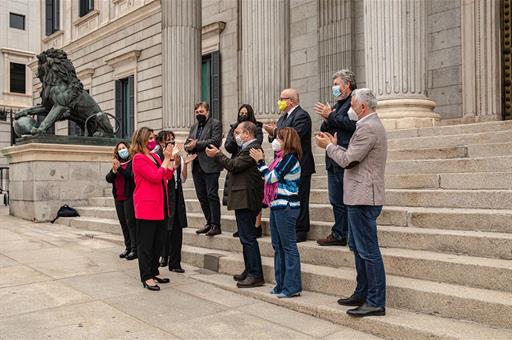After passing through the Upper House of Parliament
Ribera applauds the passing of Spain's first Climate Change and Energy Transition Act in the Lower House of Parliament
News - 2021.5.13
The Vice-President considers the law approved by the Lower House to be an "essential" document that had been postponed for too long. "We set a milestone, a starting point from which we can always look forward and go further, never less. This law addresses complex challenges at a difficult time for our society".
An enriched and strengthened text
Ribera emphasised the intense work that all the parliamentary groups have been carrying out, which shows the degree of involvement and interest that the law has aroused. After passing through Congress and the Upper House of Parliament, the amendments made have enriched and strengthened the text. The Climate Change and Energy Transition Act provides for a first upward revision of its targets in 2023. In this sense, Ribera called on the groups to "support the climate ambition pursued by the Government and to continue working towards consensus".
The impact of climate change is already evident in our country: Storm Gloria, which battered the Spanish coastline, and Storm Filomena, which immobilised a large part of the country last January, are just two phenomena that show the severity of the effects of climate change. Extreme weather events of this kind cost our country an average of almost 700 lives and 900 million Euros per year. For this reason, the Vice-President insisted on the urgency of transforming our development model and our way of life, integrating sustainability and resilience criteria.
Modernising the economy
In the last two years, Spain has made more progress than ever before in terms of climate commitments, international leadership and public policy development. However, Ribera pointed out that "more ambition is needed to tackle the path towards full decarbonisation, replace fossil fuels with renewable energies, modernise the economy and transform production and consumption models, adapt to climate impact and make these changes without forgetting any territory or any person".
In this sense, the Vice-President stressed that this project is a first step to articulate the rest of the policies and measures, and thus to guide the recovery process towards a model of lasting prosperity that respects the limits of the planet.
In her speech, Ribera said that this law "belongs to everyone and is for everyone", and she wanted to address young people in particular, who are at the same time "accomplices and the voice of conscience in terms of progress in the fight against climate change". The Vice-President noted that in the fight against climate change "we need the audacity of youth to anticipate and take advantage of the world of opportunities opened up by the technologies of the future".
Commitment to decarbonisation
Spain's commitment to decarbonisation is reflected in the emission reduction targets in diffuse sectors (mobility, thermal uses in buildings, waste and agriculture) which, with a 39% reduction, is 13 points above the 26% target set by the European Union.
On the other hand, while the European Union establishes a penetration of renewables of between 38% and 40% of final energy consumption by 2030, the National Integrated Energy and Climate Plan establishes 42% for Spain. In terms of energy efficiency, Europe considers that an increase of 36-37% is needed by 2030, while the Spanish target is 39.5%.
Non official translation





